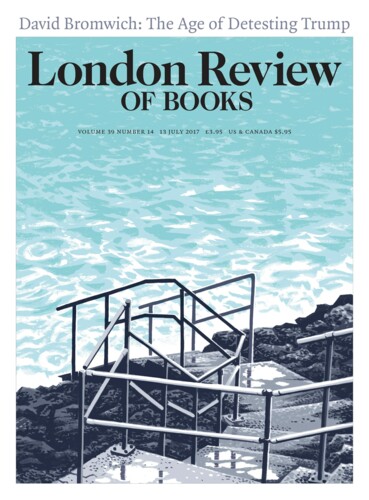An exhibition split between the Jewish Museum and the Photographers' Gallery revisits the work of Roman Vishniac, best known for recording the lives of Eastern European Jews in the years immediately before the Second World War.
Daniel Trilling
Daniel Trilling is the author of books on refugees in Europe and the far right in Britain.
The single-lane road cuts through an almost empty grassland plateau. Every so often there are signs warning drivers not to wander, at risk of death from unexploded bombs. A burned-out tank punctuates the horizon, its gun raised in salute. The road continues like this for a good twenty minutes before reaching a small car park outside a village church. On the morning of New Year’s Day the car park was almost full. People were getting out of their cars and making their way up the hill to the church: families with children and elderly relatives, a dog-walker in a camouflage anorak, a young couple in quilted jackets and Union Jack wellies.
The Estonian National Museum is a glass, concrete and steel slope that rises out of the runway at Raadi, a former Soviet air base near the city of Tartu. On a tour of the museum, which opened last year, the guide explained that its design incorporates several features of Estonia’s history. It bridges a stream that once ran through the estate of a Baltic German baron, part of the aristocracy that ruled over a largely Estonian-speaking population for centuries. The former air base is evidence of domination by Moscow: two hundred years under the Russian Empire, a brief period of independence from 1918 to 1939, then reoccupation by the Soviet Union until its break-up in 1991. And the new building, opened several months before Estonia took up the presidency of the Council of the EU, suggests how the country would like to be seen today: bright, open, European, on the up.
The genocide memorial in Yerevan, a giant complex built when Armenia was part of the USSR, sits on a ridge overlooking the city: its museum tells of how ethnic Armenians in the final years of Ottoman rule were massacred and forcibly scattered and how the lands claimed by Armenian nationalists were reduced, by military defeat and international diplomacy, to the present-day republic in the South Caucasus. Passengers who leave the metro station at Yerevan’s central square are greeted with a giant map of Greater Armenia, a historical region that mostly falls within the borders of the current republic’s neighbours: Turkey, Iran, Azerbaijan and Georgia. And on the streets, pasted to lamp-posts, walls and junction boxes, are fly-posters offering cheap minibus rides to distant cities: Krasnodar, Rostov, Novosibirsk. The republic’s economy is partly sustained by emigrant workers, most of whom go to Russia.
Should we build a wall around North Wales? The Refugee Crisis
Daniel Trilling, 13 July 2017
All of the pressures that result from international migration are also generated by migration within a country’s borders. Linguistic and cultural differences, scarce public resources, unequal distribution of wealth: all of these exist within as well as between nation-states. So why limit controls to international borders? Why not prevent people from Solihull moving to London and putting pressure on the rental market?
Podcasts & Videos
Julia Ebner discusses her experiences going undercover in various extremist groups, including White Supremacists, German Neo-Nazis and ‘Trad Wives’, as described in her new book, Going Dark.
Read anywhere with the London Review of Books app, available now from the App Store for Apple devices, Google Play for Android devices and Amazon for your Kindle Fire.
Sign up to our newsletter
For highlights from the latest issue, our archive and the blog, as well as news, events and exclusive promotions.


